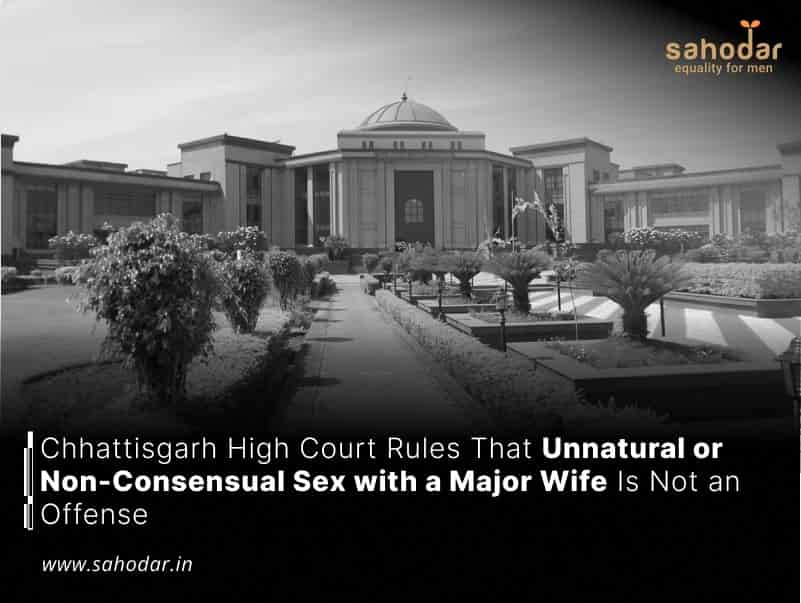The Court acquitted a man who was convicted for causing death of his wife by inserting his hand up the rectum of his wife.
The Chhattisgarh High Court recently ruled that a husband cannot be held liable for rape under Section 375 or for an unnatural offense under Section 377 of the Indian Penal Code (IPC) for engaging in non-consensual anal sex or any other non-consensual sexual act with his adult wife [Gorakhnath Sharma v. State of Chhattisgarh].
Justice Narendra Kumar Vyas based the decision on Exception 2 to Section 375 of the IPC, which states that sexual intercourse or acts by a man with his own wife do not constitute rape, provided the wife is not under 15 years of age.
“From perusal of Section 375, 376 and 377 IPC it is quite vivid that in view of amended definition of Section 375 IPC, offence under Section 377 IPC between husband and wife has no place and, as such rape cannot be made out. It is pertinent to mention here that in the amendment in Section 375 IPC in the year 2013, Exception- 2 has been provided which speaks that sexual intercourse or sexual acts by a man with his own wife is not a rape and therefore if any unnatural sex as defined under section 377 is committed by the husband with his wife, then it can also not be treated to be an offence,” the Court held.
Considering the above reasoning, the Court acquitted a man who had been convicted of rape, unnatural offense, and causing his wife’s death due to his sexual act of inserting his hand into her rectum.
Background
The accused, Gorakhnath Sharma, was alleged to have inserted his hand into the anus of his wife.
Following the incident, she complained of pain and was admitted to the hospital, where she later passed away.
Before her death, her dying declaration was recorded, in which she stated that she had fallen ill due to the unnatural sexual act committed by her husband.
As a result, the husband was charged under Section 375 (rape), Section 377 (unnatural offense), and Section 304 (causing death by negligence) of the Indian Penal Code.
The doctor who conducted the post-mortem concluded that the cause of death was peritonitis and rectal perforation.
Some witnesses later turned hostile, and the Executive Magistrate who recorded the deceased’s dying declaration stated in court that while she had informed him about her husband’s forceful unnatural sexual act, this detail was not included in the declaration.
After evaluating the evidence and relying on the dying declaration, the trial court found Sharma guilty under Sections 375, 377, and 304 of the IPC, sentencing him to ten years in prison.
This verdict was subsequently challenged in an appeal before the High Court.
High Court ruling
The defense counsel argued that the conviction was based solely on the dying declaration, the authenticity of which was questionable. It was also contended that the trial court overlooked the statements of two witnesses who testified that the victim had been suffering from piles since her first delivery, which often caused bleeding from her anus and abdominal pain.
On the other hand, the State’s counsel opposed the appeal, asserting that the trial court had correctly convicted the accused based on the available evidence and that no interference was warranted.
After reviewing the arguments and evidence, the Court analyzed Sections 375 and 377 of the IPC.
The Court observed that under Section 375, rape includes the penetration of a penis into any part of a woman’s body, including the vagina, urethra, or anus. However, it emphasized that such acts between a husband and wife do not constitute rape, even without consent, as they are explicitly exempted by Exception 2.
“It is quite vivid that the definition of rape as provided under Section 375 includes penetration of penis in the parts of the body i.e. vagina, urethra or anus of a woman for which consent is not required then unnatural sex cannot be made as unnatural offence between husband and wife, as such apparently, there is repugnancy in these two situations in the light of definition of Section 375 and unnatural offence of Section 377,” the High Court said.
Therefore, if such an act does not constitute an offense under Section 375, it also cannot be considered an offense under Section 377 of the IPC.
“If the age of wife is not below age of 15 years then any sexual intercourse or sexual act by the husband with her wife cannot be termed as rape under the circumstances, as such absence of consent of wife for unnatural act loses its importance, therefore, this Court is of the considered opinion that the offence under Section 376 and 377 of the IPC against the appellant is not made out,” the Court underscored.
Regarding the dying declaration, the Court stated that it lacked corroboration from any other evidence.
“The careful scrutiny of the dying declaration by this Court itself the same cannot be found to be sufficient for recording of the conviction as there is no corroboration from other evidence, as such there is doubt over the correctness of the dying declaration,” the judgment stated.
Regarding the conviction under Section 304 of the IPC, the High Court noted that the trial court had not provided any findings to establish how the offense applied in this case.
As a result, the Court held that the conviction under Section 304 was flawed and legally unsustainable.
In light of these observations, the appeal was allowed, and Sharma was acquitted of all charges.

